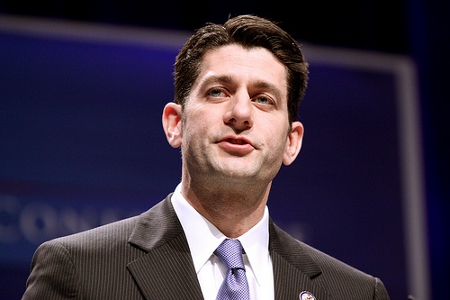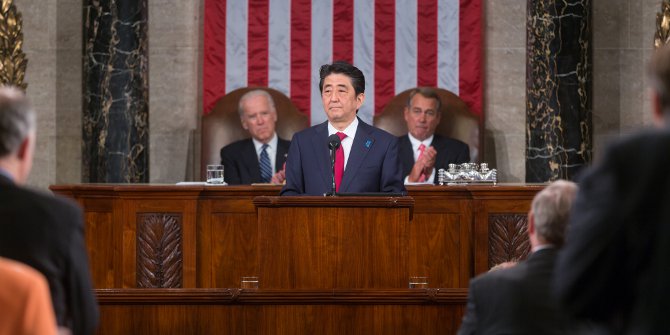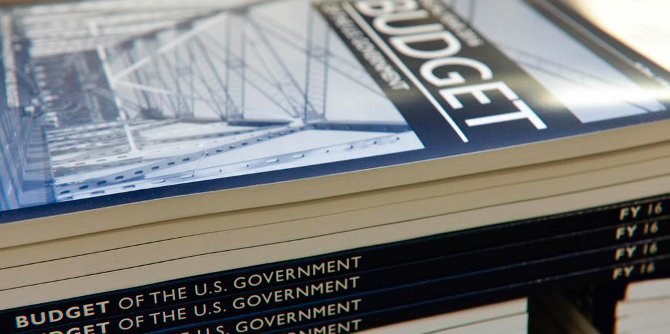USAPP Managing Editor, Chris Gilson looks at the best of the week’s political blogging from academics and think-tanks. Don’t see a blog referenced here that you think we should be reading? Let us know what we’ve missed out and we’ll try to include it next week.
Jump to
[one_half last=”no”]
The Trump Administration and the Republican Party
The Democratic Party
The House and Senate
Elections and American democracy
[/one_half][one_half last=”yes”]
The Government, Beltway and the Supreme Court
Foreign policy, defense and trade
Obamacare and health policy
The economy and society
[/one_half]
The Trump Administration and the Republican Party
On Monday, Lawyers, Guns & Money says that the “deep state” idea that has been doing the rounds recently – the concept that institutions are acting as a check on Donald Trump – is a harmful one, because it ignores the idea that divisions between civil society and the state are actually quite contested. Later in the week, Political Violence @ A Glance examines “principles of ethical resistance” for US federal civil servants.
In the wake of Donald Trump’s long and rambling press conference last week, Monkey Cage comments that Trump’s meetings with the press are beginning to look a great deal like those of Russian President, Vladimir Putin, where politics are often a show and dissent only permitted to a certain point. Lawyers, Guns & Money takes this idea further, arguing that his tweets calling the media “the enemy of the people” show that Trump is in fact an authoritarian. Outside the Beltway also takes up Trump’s war on the news media, writing Saturday that targeting the media is nothing new for Trump, or even for American conservatives.

Ahead of President’s Day on Monday, ImmigrationProf blog writes that no matter how many travel bans Donald Trump issues, he still does not have “absolute power” (or “plenary power”) to violate the Constitution. As the Trump administration works to finalize its next executive order, it has apparently ordered both the Department of Homeland Security and Justice to on immigration help build the legal case for the temporary travel ban, and, according to Lawfare, these departments are disparaging the work of employees in the intelligence community who disagree with the ban.
On Monday, FiveThirtyEight delves into why polls are disagreeing on how popular Donald Trump is. His approval ratings vary from 39 to 55 percent, something that they attribute to how the specific polls are run and the groups that they sample.
Many already want to get rid of Trump, either through impeachment or via the 25th Amendment. Nicholas Kristof suggests that for the most part, we may be stuck with him for now – though there may be further shocks to come from an already very shocking presidency. Balkinization meanwhile wonders if New York State has a copy of President Trump’s federal tax returns, returns which he has consistently refused to release. Apparently section 6103(f)(5) of the US Tax Code would authorize the Commissioner of the New York Department of Taxation and Finance and the Attorney General to forward Trump’s tax returns to Congress if they thought that they “may relate to possible misconduct, maladministration, or taxpayer abuse”.
In order to pay for its high-profile projects such as the border wall with Mexico, the Trump administration needs to make some choices about what to cut. Beat the Press says that for example, the administration could choose to cut federal funding for Legal Services –which provides legal assistance to those on low incomes – or to the Corporation for Public Broadcasting. They point out that the need for these cuts could be eliminated if Trump did not demand Secret Service protection for his wider family, and if he limited his own travel as well.
On Thursday, Lawyers, Guns & Money comments that the Trump administration’s revocation this week of guidelines giving transgender students the right to use public school restrooms is an example of Trump’s “callous bullying” , which also reflects where the wider GOP are.
On Tuesday this week, Lawfare talks on what they say is the “proper role” of the White House Counsel, a position currently held by Don McGahn. They say that White House Counsels would do well to refrain from weighing in on the substance of policy questions, given that they are “the lawyer and not the client”.
Greg Mankiw’s Blog is amazed and confounded this week that the Trump administration is considering changing the way in which US trade deficits are calculated, in order to make the deficit look bigger.
Recent days have seen debate over whether or not President Trump is in fact an anti-Semite. Lawyers, Guns & Money says that the media’s focus on Trump’s personal views is beside the point, and that the Trump administration itself has missed several opportunities to condemn anti-Semitism.
Turning to the Republican Party more specifically, Beat the Press discusses the confusion over the GOP’s corporate income tax proposals. They say that while some have argued that the 20 percent import tax may lead to a spike in inflation, we have very little idea what the result might be if the tax were to be implemented.
This week saw conservatives turn on one of their own in the form of commentator Milo Yiannopouos who had his invitation to the Conservative Political Action Conference (CPAC) rescinded after the release of videos where he appeared to endorse pedophilia, writes Outside the Beltway. They comment that people like Milo are a problem for the American right because they are considered to be celebrities just for making statements which anger the left.
The Democratic Party
This week saw the culmination of the race for a new chair of the Democratic National Committee (DNC). Lawyers, Guns & Money says that despite the fact that it “barely matters who the winner is, they support Keith Ellison, the US Rep for Minnesota’s 5th district, over former Secretary of Labor, Tom Perez, because the “energy is behind” him and he represents a more leftist future for the party. FiveThirtyEight meanwhile writes that the DNC race has turned into a “group therapy session”, in the wake of losing last year’s presidential election.
The House and Senate

On Wednesday, Lawyers, Guns & Money talks on the “further adventures of Paul Ryan, serious policy wonk”. They write that the Republican Speaker of the House, has a serious proposal towards raking away people’s health insurance to pay for upper-class tax cuts, and that he is defending it against Democrats’ attacks.
On Wednesday, Outside the Beltway says that GOP budget-hawks have a Donald Trump problem, as they are waking up to the fact that the new president does not seem to care how his campaign promises – such as the border wall with Mexico – are paid for. According to some projections, Trump’s spending plans could cost as much as $15-20 trillion over the next decade.
Turning to the US Senate, Lawyers, Guns & Money comments that while many in the media are keen to crown Senator John McCain (R-AZ) as a “maverick” who opposes Donald Trump, the Senator has only opposed one of Trump’s cabinet nominees and actually tends to vote the GOP party line in any case.
On Tuesday, FiveThirtyEight reports that in an apparent throwback to the 1980s, people are faxing their Senators up to 300 times an hour – usually to tell them to stand up to Donald Trump’s agenda.
Elections and American democracy
This week Scatterplot looks at a few problems with a pie chart which has been doing the rounds recently, which apparently shows the percentage who voted last year for Trump or Clinton, or didn’t vote, or weren’t eligible. They write that the chart – which showed that 29 percent of Americans were ineligible to vote – isn’t quite correct as it included children as being ineligible. Their new chart shows that 7.6 percent of adults in the US were ineligible to vote.
On Wednesday, Smart Politics writes on the upcoming special election for Georgia’s 6th Congressional District in April to replace Tom Price, who is now Secretary of Health and Human Services in the Trump administration. Democrats are hoping to win the seat by making it a referendum on Trump, but it would be an unusual feat for them to do so.
Sabato’s Crystal Ball previews the 2018 cycle’s gubernatorial races this week, commenting that 36 states will have such elections, which will be crucial to how the 2020 round of redistricting will operate.
Talking of elections, to a lot of people, Donald Trump’s rallies and rhetoric look a lot like election campaigning. Monkey Cage says that the new president’s campaigning is actually quite similar to that of his predecessors’ – it’s just that Trump is more up front about it.
On Friday, Saideman’s Semi-Spew looks at how to fight voter fraud: what they say are the GOPs’ efforts to suppress likely Democratic voters.
A member of the Federal Elections Commission, Ann Ravel, announced her resignation this week, effective in March. Election Law Blog writes that while Ravel leaves the agency in a state of great dysfunction, Trump can now use her vacancy to break the current deadlock on the commission and “turn the agency into an engine for deregulation”.
On Thursday, Monkey Cage explains why the US’ democracy was just demoted from “full” to “flawed” in a recent report by the Economist Intelligence Unit.
The Government, Beltway and the Supreme Court

On Monday, Angry Bear ponders whether Janet Yellen is the “best Fed chair ever”, given that inflation has remained below 2 percent during her tenure, and we have avoided “bubbles and crashes”. The Grumpy Economist meanwhile looks at what the Fed’s long-term interest rate target should be and looks at the ins and outs of economic modelling and the “natural” real rate of interest.
On Friday, Lawfare covers two memos issued by the Secretary of the Department of Homeland Security which cover immigration enforcement. One of the memos would return undocumented non-US citizens to Mexico prior to a hearing, a move which could see nationals from Central American countries sent there as well.
Turning to the Courts, Election Law Blog has some insights into Supreme Court nominee Neil Gorsuch’s thoughts on partisan gerrymandering. Taking one of Gorsuch’s dissenting opinions, it looks like he may well be happy to hear gerrymandering cases before the Supreme Court.
The Volokh Conspiracy reports this week that a federal court has recently ruled that the police cannot simply share the contents of someone’s seized iPhone with other agencies. In Thursday, Outside the Beltway says that the Fourth Circuit Court has upheld Maryland’s ban on certain types of “assault weapons. The ruling overturns an earlier judgment which found that the law was unconstitutional.
Foreign policy, defense and trade
On Monday, ImmigrationProf Blog writes that the seven countries affected by President Trump’s January 27th travel ban have accounted for more than 900,000 entries since 2006.
This week saw Donald Trump choose H.R. McMaster to be is new national security adviser, replacing Mike Flyyn who resigned after not telling the truth about his contacts with Russia before the inauguration. Lawyers, Guns & Money writes that McMaster is “universally well-respected in the national security community”, but one of the biggest questions going forward will be, “will Trump actually listen to him?”
On Wednesday, Lawfare also talks foreign policy – more specifically on the 53rd Munich Security Conference. They say that while most of the speakers including Senator John McCain (R-AZ) avoided naming Trump, he still dominated the conference. Monkey Cage this week asks whether the White House is ready for what they term foreign policy “nightmare scenarios”, from a Mexico-Russia security pact to testing NATO’s resolve in Estonia.
Bradford DeLong writes this week that 21st century American nationalism must be “profoundly cosmopolitan”, in reference to discussions about renegotiating deals like NAFTA which should also consider the positive effects on other countries, not just the US.
Obamacare and health policy
On Sunday, Monkey Cage writes that the prospects for a quick repeal of Obamacare are shrinking, after asking forecasters to predict whether or not the program’s individual mandate will be repealed before April’s end. Now, they estimate only a 35 percent chance that it will be.
Lawyers, Guns & Money wonders whether or not the House Freedom Caucus will save the Affordable Care Act, by opposing a replacement plan which would allow Americans to buy insurance coverage with refundable tax credits. By being against the plan, the Freedom Caucus may well prevent the House from passing any sort of Obamacare repeal and replacement.
The economy, society and criminal justice
The idea of a basic income for everyone in a country is one which has gained in popularity in recent years, especially as fears of the elimination of many jobs due to automation continue to grow. OUPblog looks at whether such a basic income is “crazy or essential”. Staying on anti-poverty programs, Chris Blattman looks at if the only thing that anti-poverty programs are missing are the “long arm of the law”, citing examples such as tickets for minor offense that will be forgiven if the perpetrators enroll in rehab or visit a local counselor.
On Thursday, Beat the Press looks at the commentators who would call themselves “free traders” but do not actually believe in it. Rather, they actually push selective protectionist policies which redistribute incomes towards people like themselves.

This week Noahpinion makes the case for why liberals should own guns, because it would make their calls for gun control more credible, and it would be insurance against any breakdown in public order.
Monkey Cage reports on a new Pew survey which shows that Muslims are the least popular religious group in the US, and are disliked even more than atheists are.
Earlier this month, President Trump announced a new effort to impose harsher penalties on those who hurt or kill police officers. FiveThirtyEight says that the “Blue lives matter” effort won’t do anything to reduce accidental deaths – which make up for more than half of on-duty deaths – and may even have a chilling effect on legitimate protests against the police.
Featured image credit, Senator John McCain: Gage Skidmore (Flickr, CC-BY-SA-2.0)
Please read our comments policy before commenting.
Note: This article gives the views of the author, and not the position of USAPP– American Politics and Policy, nor of the London School of Economics.
Shortened URL for this post: http://bit.ly/2lT7hSF






